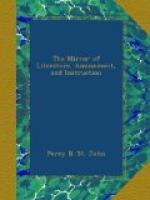“A water-kelpie,” murmured another of the Captain’s gigs, a Scotchman.
The men were evidently alarmed, “Stretch out, men: never mind the shark. He can’t jump into the boat surely,” said the skipper. “What the deuce are you afraid of?”
We arrived within pistol-shot of the ship.
As we approached, the sentry hailed, “Boat, ahoy!”
“Firebrand,” sung out the skipper, in reply.
“Man the side—gangway lanterns there,” quoth the officer on duty; and by the time we were close to, there were two sidesmen over the side with the manropes ready stuck out to our grasp, and two boys with lanterns above them. We got on deck.
[12] “Leave me room, countrymen—leave me room, my children.”
[13] Equivalent to “Pull, you devils, pull!”
* * * * *
The Gatherer.
* * * * *
The Emperor Adrian and the Architect Apollodorus.—When Apollodorus was conversing with Trajan on some plans of architecture, Adrian interfered, and gave an opinion, which the artist treated with contempt. “Go,” says he, “and paint gourds” (an amusement which Adrian was fond of), “for you are very ignorant of the subject on which we are conversing.” When Adrian became emperor, the affront was remembered, and it prevented Apollodorus from being employed. Nor was the opinion which Apollodorus gave with respect to the plans of a sumptuous temple of Venus forgotten: viz.—upon seeing the statues sitting, as they were, in the temple (which, it seems, wanted much of its due proportion in height), he said, “if the goddesses should ever attempt to stand upon their feet, they would assuredly break their heads against the ceiling.” Adrian, meanly jealous and inexcusably revengeful, banished the architect, and having caused him to be accused of various crimes, put him to death.
P.T.W.
* * * * *
Juan Rufa said—“There are two classes of persons who are inconsolable, the rich on the point of death, and women on the departure of their beauty.” He said, on another occasion, “that he who defined a compliment to be an agreeable falsehood, which serves as a net to catch dupes, was not far short of the truth, since the greater part of compliments are expressions directly at variance with internal conviction.”




